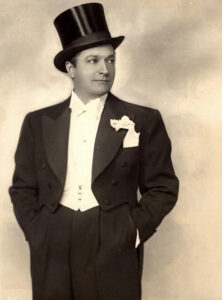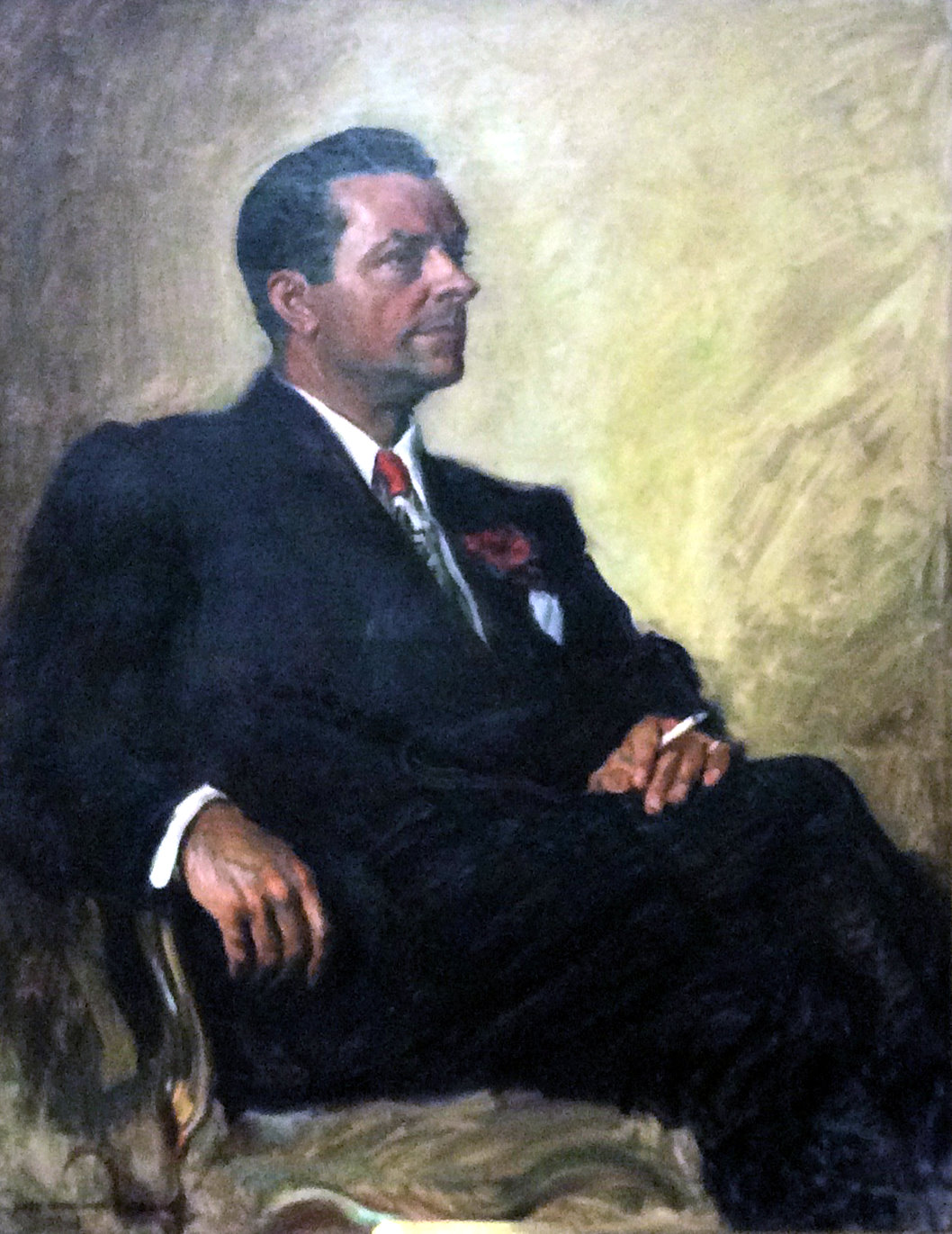 William Anthony Gaxton (December 2, 1893 – February 2, 1963) was a star of vaudeville, film, and theatre. Gaxton was Shepherd from 1936-1939, 1952-1953, and 1957-1961. He is an Immortal Lamb.
William Anthony Gaxton (December 2, 1893 – February 2, 1963) was a star of vaudeville, film, and theatre. Gaxton was Shepherd from 1936-1939, 1952-1953, and 1957-1961. He is an Immortal Lamb.
He was born Arturo Antonio Gaxiola in San Francisco. While attending the University of California he made his stage debut, earning 55-cents a performance. Amateur productions led to a desire to pursue a theatrical career and he moved to New York. After serving in the U.S. Navy in the Great War, his career took off in the Jazz Age, working with the biggest names in the era.
In 1922 Gaxton made his first Broadway appearance; this was in Irving Berlin’s Music Box Revue and over the next few years he developed his singing and stagecraft. His breakthrough came when he took a starring role in Richard Rodgers and Lorenz Hart’s A Connecticut Yankee (1927). In this show, Gaxton sang what was to become an enduring standard, “Thou Swell,” and in the process began to secure his lasting stage fame. In 1929 he consolidated his standing, this time in Cole Porter’s Fifty Million Frenchmen, singing another standard-to-be, “You Do Something To Me.”
In the early 1930s he was in successive George and Ira Gershwin musical comedies, Of Thee I Sing (1931) and Let ’Em Eat Cake (1933), then went into Porter’s Anything Goes (1934). In all three of these shows, Gaxton’s elegant sophistication was contrasted with Victor Moore’s bumbling comedic stage presence. In the Porter show he had two more hit songs, a solo, “All Through The Night,” and a duet, “You’re The Top,” with co-star, Ethel Merman.
Gaxton made several movies. A classic is It’s the Old Army Game (1926) a silent comedy film starring W. C. Fields and Louise Brooks.
Gaxton was never a Hollywood star and remained in New York. He retired in the 1940s. He spent his last years working for The Lambs as Shepherd in the 1950s. In 1951 The Lambs honored Gaxton for his 35 years as an entertainer by dedicating the annual Gambol to him. He was also a trustee of The Actors Fund.
From 1917 until his death, he was married to Madeline Cameron, née Seitz, a former Ziegfeld Follies dancer. The couple had a farm in Stamford. Following his death, his widow was given and honorary life membership when the club began accepting women members in the 1970s.
Gaxton died on February 2, 1963. He was 69. For his stewardship and guidance during the rocky times in the club’s history, he was named an Immortal Lamb.
From The Lambs’ Script, July-August 1944 issue
Only three gentlemen from the State of California have ever attained the highest office within The Lambs. Had they been a Vaudeville trio, they might have been billed as “The Three G’s,” otherwise known as Greene, Grismer, and Gaxton. Currently the only one of the three getting billed is Gaxton.

Billy Gaxton was born in San Francisco; he loved the Theatre and its people from the time he could toddle and at the age of seven had already chosen his favorite leading lady. Passing his early stock and vaudeville experiences on the West Coast, the young man looked East. Gaxton arrived at the corner of 47th and Broadway one day in 1914, where he paused to take a reading of his bankroll to find he had a total cash balance of thirty-five cents.
Even then he would have laid you six, two, and even that Broadway couldn’t lick him, ‘tho he might reasonably have demanded even money against his chances of seeing his name in lights half way up the block over the Palace Theatre as quickly as it happened–presuming you believe, as we do, that 12 years is a quick jump from nothing to everything.
During World War I, Bill joined the Navy and his immediate superior who shoved him around in the line of duty later became quite famous for shoving a lot of people around: Humphrey Bogart. Bill played the Palace Theatre for 10 consecutive weeks one season, which constitutes the longest run for any legitimate actor in the theater’s history. He has another “longest” record: having had the longest consecutive run on Broadway than any other shepherd ever elected by The Lambs.
Broadway still runs it’s crooked course, and the crooked, of course, still run Broadway, but those conditions existed during the time Bill Gaxton and was turning his thirty-five cents into a farm in Connecticut, a beautiful wife, social and professional security, and a comfortable niche in the living Hall of Fame, therefore no man may say the stewards gave Bill a break in the weights. He came down in front solely because he had heart and speed.
Gaxton’s explanation of how he became a Lamb is very interesting. When Bill joined in 1923, the admission fee was $250; that was also the year that Jack Dempsey was scheduled to prove he could hit harder and faster for money then could Tom Gibbons. Gaxton had, through the years, been vitally interested in the art of fisticuffs and felt himself to be no mean picker of winners. This laid him wide open to argument, especially with other actors who also believed they, too, knew a great deal about the top-flight fighting fellows and could predict the outcome of any important quarrel. Among those who believed that Dempsey could put Gibbs to sleep much quicker than Walter Winchell was Walter Catlett, who went so far as to declare Dempsey could exterminate Gibbons in nine minutes or less. Catlett kept repeating this belief quite often and quite audibly while waving a fistfull of cabbage for emphasis and inviting all within the sound of his voice to come and get it if they believed otherwise.
This irked Gaxton to no end. He kept fingering the $250 worth of legal lettuce in his pocket intended for his admission fee to The Lambs; but Catlett’s insistence that Gibbons was an unskillful fellow with his fists, totally incapable of surviving Dempsey’s death-dealing dukes for even three rounds, finally became more than Gaxton could bear. He unleashed the rubber band that bound his bankroll and, withholding fifty cents for lunch money, he wagered Catlett $249.50 that Gibbons was officially robust enough to escape anesthetization for the brief period mentioned by Catlett. The night of the fight, during the first three rounds it was evident that Gibbons was bleeding from the nose, but what was not evident in the poker-faced Gaxton was the fact that he was virtually bleeding from every pore. However, they both survived. Gibbons went into the 15th round and Gaxton went into The Lambs.
Since then Billy Gaxton has made an enviable record, both in the Theatre and in The Fold. He starred in A Connecticut Yankee (1926-27), followed by 50 Million Frenchmen (1929). In 1931 and ‘32 he saw his name in lights over the first musical show ever to win the coveted Pulitzer Prize, titled Of Thee I Sing.
Oddly enough, Gaxton’s greatest thrill did not emanate from such things, nor from membership on the World’s Fair Entertainment Committee, nor as chairman of the Greater New York Fund, organizing an army of stars for the gigantic entertainment at Madison Square Garden. It came from Ray Peck pulling at his sleeve one night in our lobby and indicating a man at the desk. Bill looked at the old gentleman and asked Peck what was remarkable about him. Peck explained the man happened to be William J. Ferguson, a good Lamb, who was the call-boy at Ford’s Theatre in Washington during the presentation of Our American Cousin on the night of April 14, 1865, and who, while peering from the wings toward the President’s box became an eyewitness to that frightful assassination of Mr. Lincoln.
Gaxton was elected Shepard in 1936, installed by Albert O. Brown, and served faithfully through three exciting terms in our highest office. Lack of space forbids details of his virtually feeling the hot breath of the sheriff down his official neck when the life of The Lambs hung by a thread; of Gene Buck’s inspired speech. With Jim Corbett at his elbow and counseled by those stalwarts whose love for The Lambs has been tested and proven so often, Raymond Peck and Albert O. Brown–how they, with the generous help of the late Robert L. Hague and others, kept the sheriff and his padlock on the doorstep while they raised $86,000 in exactly an hour and a half! If Floreant Agni can come to mean to all of us what it has meant when uttered by these gentlemen and their kind, The Lambs will indeed flourish–and to the end of the world.
–By Tom McElhany